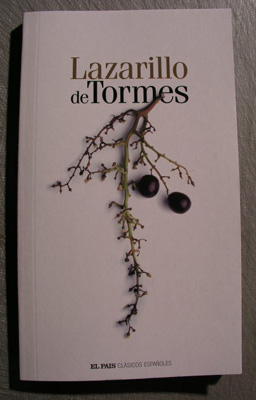April 8, 2005
Lazarillo de Tormes

Today in our Spanish lesson, we touched on Joaqu?n Cort?s, the famous Spanish dancer. This, I did not know beforehand. So, now I google:
Si Antonio Banderas es el embajador de Espa?a en lo que respecta al cine, Joaqu?n Cort?s lo es en cuanto al flamenco. Es raro que alguien venerado en el mundillo del arte gitano sea al mismo un fen?meno de fans. Y adem?s con fans en todo el mundo. Pero por algo Joaqu?n es el rey del flamenco para masas ?muy a pesar de algunos puristas- y tambi?n un nombre respetado en las altas esferas del flamenco.
Translation: He's a pretty good dancer.
The palabra "gitano" comes up and Elena, our teacher tells us Joaqu?n is a gypsy, and we talk at length obout gypsies and the cultural legacy in Spain. Apparently, the gypsy tradition is mixed into Spain at a fundamental level. Flamenco comes from this, so says Elena.
I risked fashioning a stereotype by associating the literary tradition of the picaro with Spain. I mentioned a book that Elena didn't know, Sallinger's "Catcher in the Rye". Holden Caufield was a character outside of society, apart, critical, sometimes, most times hostile. My first awareness of this kind character type was in John Fante's "Ask the Dust". Googling, I can't find the text online in a free download, so I settle for this summary site:
Like C?line's Bardamu, Svevo's Zeno, or Dostoyevsky's ?Underground Man,? Fante's literary alter-ego is a stewing cauldron of nihilistic self-absorption, and every bit as memorable. He is given to febrile rants and arias of grief, often switching from first-person to second to a self-aggrandizing third within the space of a page, sometimes a paragraph. When he's not chastising himself (?You are a coward, Bandini, a traitor to your soul, a feeble liar before your weeping Christ?), he's indulging in delusions of grandeur (?I stood before the mirror once more, shaking my fist defiantly. Here I am, folks. Take a look at a great writer! Notice my eyes, folks. The eyes of a great writer. Notice my jaw, folks. The jaw of a great writer.?). For all his arrogance, Bandini is an endearing buffoon, and his confessional outpourings are shot through with black humor. Here's Bandini walking the streets of downtown LA:
I took the steps down Angel's Flight to Hill Street: a hundred and forty steps, with tight fists, frightened of no man, but scared of the Third Street Tunnel, scared to walk through it?claustrophobia. Scared of high places, too, and of blood, and of earthquakes; otherwise, quite fearless, excepting death, except the fear I'll scream in a crowd, except the fear of appendicitis, except the fear of heart trouble . . . Otherwise, quite fearless.The prose has the immediacy and colloquial fluency of the Beats, whom Fante prefigured by over a decade. Charles Bukowski, dogged champion of free-form verse, called Fante ?my God,? and was responsible for bringing his work to the attention of Black Sparrow Press. In the preface to Ask the Dust, Bukowski describes the day he discovered the book in the Los Angeles Public Library, carrying it away ?like a man who had found gold in the city dump.? Fante, he writes, ?was not afraid of emotion. The humor and the pain were intermixed with a superb simplicity . . . [the] book was a wild and enormous miracle to me.?
After attempting a description of this in my crude Castellano in class today, Elena hands me this book, apparently (notice my hedge here, I don't want to come off like I really know this stuff) a classic in Hispanic literature: "Lazarillo de Tormes". Evidently, this is the origin of the literary tradition of the Picaro in Spain... as far as I can tell so far.
And guess what? I found a site where you can download a Spanish/English version of the book, "Banned by the Spanish Inquisition". Click here, and click "download" in the left hand margin. You can get your own PDF! How fantastic!
Now, if I can do the same with "Ask the Dust"...
Posted by Dennis at April 8, 2005 6:51 PM
Leave a comment